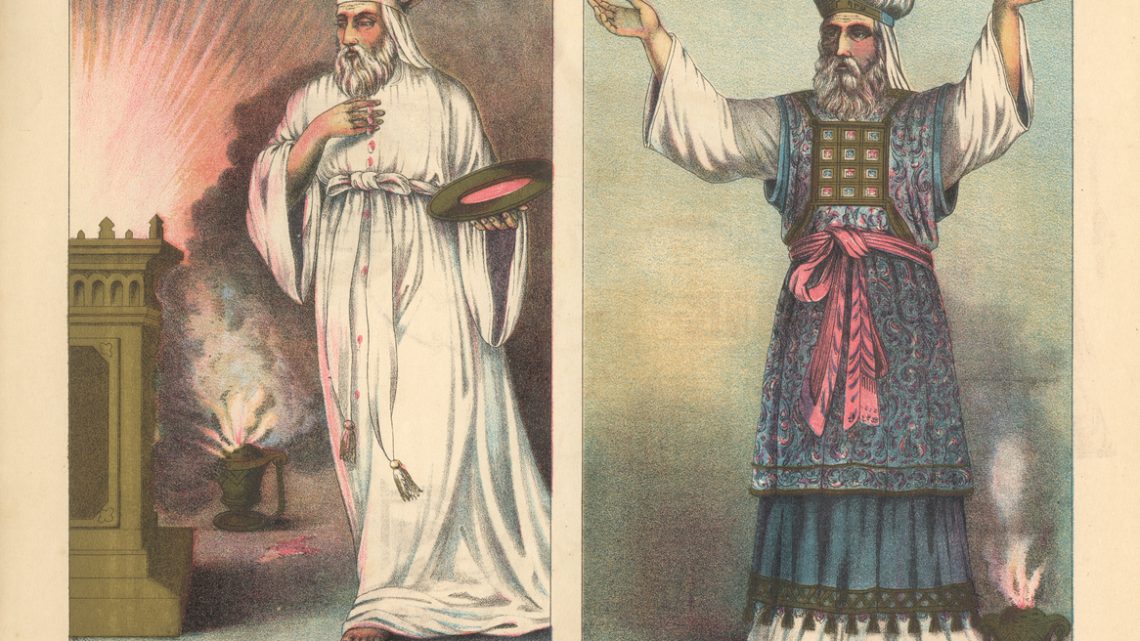Sabbath School Lesson for April 28-May 4, 2018
It might seem that we should already have enough knowledge of the plan of salvation, after Jesus has come to earth and died for our sins. But it seems God wants us to have an even clearer picture of how heaven is involved by giving us the illustration of the earthly sanctuary. Indeed, the symbols in Revelation are understood only when one is familiar with the sanctuary model of the Old Testament.
One might believe that we have an advantage of living after Calvary happened, with the animal sacrifices no longer being needed. But the up-close experience of witnessing the daily death of those innocent animals certainly served the purpose of reminding the Israelites (at least some of them) that their salvation comes with a very real and bloody cost. We too must keep the cost of the Lamb in mind each and every day of our lives.
Understanding the role of the Lamb of God and our High Priest, and the significance of the Day of Atonement, are aspects of the sanctuary service that we will examine this week in order to get a better understanding of what we can do to prepare for events to come. What kind of preparations were made prior to the Day of Atonement back then should especially interest us. After all, judgment was part of the first angel’s message in Revelation 14 and that’s what the Day of Atonement represented.
Focus Text: “God exalted him to the highest place and gave him the name that is above every name, that at the name of Jesus every knee should bow, in heaven and on earth and under the earth.” Philippians 2:9, 10 NIV
Knowing what Christ has done, is doing, and will do in the heavenly sanctuary will one day cause all God’s creatures to acknowledge His presence and power. His duties as High Priest, especially as they pertain to the Judgment, will be more easily understood when seen through the lens of the earthly sanctuary.
Sunday: Supreme Sacrifice
The sacrifice has been made, but let’s ponder what that enormous sacrifice meant for the Son of God.
- How could an immortal God, as Jesus surely was, die in the first place? He had to sacrifice His immortality, at least for His time here on earth. (1 Timothy 6:16)
- He also gave up His kingly position, and humbly took the form of a servant. (His obedience to the Father was just as significant, if not more so, than ours.) How much more humility it would require for the Ruler of the Universe to render the same obedience and service as His subjects. (Philippians 2:7, 8)
- Understanding the prophecies more intimately than anyone, Jesus also would have known exactly what His crucifixion would encompass, including when it would occur. Yet He continued to focus on His ministry and show His faith in the mission to save mankind, despite the unpleasant outcome He knew awaited Him. (Luke 9:22)
Discussion Questions:
Read 1 Timothy 1:17, 6:16, Revelation 1:18, and Philippians 2:6-8. Why did Jesus have to sacrifice His immortality to save us? How was He able to die and rise again to life three days later?
Read 1 Corinthians 15:54-58. What gives us the courage to go through trials and continue our work here on earth?
Read Matthew 17:22. How did the disciples felt about this news? How do you think it affected Jesus?
Monday: The Lamb of God
Just as the whole salvation process began in the courtyard altar of the earthly sanctuary, the pinnacle of Jesus’ priestly ministry occurred at Calvary, when He became the Lamb of God and was sacrificed for our sins. See Isaiah 53:7.
The four Gospels tell the story of His role as the Lamb, John the Baptist recognizing it right away when he declared Jesus “the Lamb of God, who takes away the sins of the world” (John 1:29). The final act of the Lamb’s sacrifice being the cruel nailing of Him to the cross.
His role as our Sacrifice is mentioned repeatedly in John’s vision. The words Lamb or Lamb of God are mentioned at least 25 times in the book of Revelation. His contribution to our salvation is undeniable. We are naturally drawn to this Savior, who sacrificed everything for us to be with Him again in an earth made new.
Discussion Questions:
Read John 1:29. Why do you suppose John the Baptist recognized the sacrifice Jesus would make for our sins before Jesus’ disciples did?
Read Isaiah 53:7, Matthew 5:39, 44 and Matthew 26:62, 63, and 27:13, 14. Why do you think Jesus was silent before His accusers? Was it just to fulfill prophecy?
Read Revelation 5:12, 13:8 and Exodus 20:3, 5. How does Jesus being worshiped in this way signify His divinity? Why would it have to indicate that He was indeed God?
Tuesday: Our High Priest
Jesus’ story doesn’t end with the Gospels and His sacrifice at Calvary. After His resurrection and ascension, He continues to minister in the heavenly sanctuary, moving from one compartment to the next, as the plan of salvation draws to its momentous ending.
The book of Hebrews reveals much about this important role of Jesus as High Priest in heaven. It claims that His priesthood surpasses that of the Levitical priesthood, which must have raised the eyebrows of the Jews who read this letter, which is, of course, addressed to them.
John’s vision, as shared with us in the book of Revelation, is full of images of Him as well, sitting on the throne next to God, ministering justice and mercy, interceding for His people on earth. All duties of the High Priest that He ultimately became.
Discussion Questions:
Read Hebrews 7:24-27, 8:6 and Jeremiah 31:31-34. In what ways are Jesus’ sacrifice and priesthood better than what the Israelites had up to that time? Why is it spoken of as a better covenant? Did our requirements for keeping the covenant change?
Read Hebrews 9:11-15 and 10:1. What did Jesus do for us that the earthly sanctuary services could not do?
Why is Christ’s role as High Priest necessary for our salvation? Wouldn’t His death on the cross have been enough to secure our redemption?
Wednesday: Our Intercessor
As anyone who has been accused of a crime will testify, the outcome of a trial often depends on how good a lawyer has defended your case.
Jesus, likewise, appears as our Representative in the heavenly courts. But instead of presenting our merits, He submits His own righteousness as evidence of our innocence. With this sinless Lawyer on our side, there is no way we can lose. It’s an open-and-shut case!
It’s important for Jesus to act in this role of Intercessor even now, because we continue to “mess up” and sin occasionally, despite our best efforts. Thankfully, our Savior is always on duty in the courts of heaven, ready to stand up and defend us, as long as we repent and plead for forgiveness and victory.
Hebrews 6:19, 20 calls this system of justice our “anchor of the soul”. Knowing God is there for us as Intercessor has a calming effect. We can conduct our day-to-day business with confident boldness. With God in the center of our lives, we are certain of a perfect outcome and reward. Any trials that come in between are just temporary and won’t matter in the larger scheme of things.
Why is Jesus referred to as a priest “according to the order of Melchizedek”? A few things seem to make Jesus’ priesthood stand out from the Levitical priesthood.
- Melchizedek was king of Salem to whom Abraham paid his tithe, and Jesus is also known as a King.
- Melchizedek had no genealogy with the people of Israel. Jesus came from the tribe of Judah, not Levi.
- In addition, Jesus’ priesthood is eternal, whereas the Levites’ wasn’t.
“For it is evident that our Lord arose from Judah, of which tribe Moses spoke nothing concerning priesthood. And it is yet far more evident if, in the likeness of Melchizedek, there arises another priest who has come, not according to the law of a fleshly commandment, but according to the power of an endless life…there is the bringing in of a better hope, through which we draw near to God.” Hebrews 7:14-16, 19 NKJV
Discussion Questions:
Read Ephesians 2:18 and 1 Peter 3:18. What gives Jesus the right and ability to be our Intercessor?
Read Hebrews 7:1-4, 6, 8:1 and Psalms 110:4. What did it mean that Melchizedek had no father and no mother?
Read Hebrews 6:19, 20. What does Jesus’ intercessory work do for us, His people?
Thursday: The Day of Atonement
Two Bible references, one in Daniel and the other in Revelation, causes us to focus on the sanctuary, and especially the yearly observance called the Day of Atonement, or cleansing of the sanctuary. This yearly feast day, described in Leviticus 23:26-32, signified a time of judgment for God’s people.
The longest time prophecy given to Daniel was the 2,300 day/years, with its end signifying the “cleansing of the sanctuary”. According to many Bible scholars, who were able to pinpoint the beginning of the prophecy, this 2,300-year period would have ended in 1844.
“And he said to me, ‘For two thousand three hundred days, then the sanctuary shall be cleansed.’ “ Daniel 8:14 NKJV
We then hear John mentioning a judgment that is declared by the first of three angels’ messages…
“saying with a loud voice, ‘Fear God and give glory to Him, for the hour of His judgment has come, and worship Him who made heaven and earth, the sea and springs of water.’ “ Revelation 14:7 NKJV
When one believes we are living in the end times, as this time prophecy and the signs we see around us seem to indicate, we would do well to examine what the Israelites did to prepare themselves during their waiting time before the Day of Atonement. Leviticus 23:32 and Numbers 29:7 both point to a process of not working, and of “afflicting” their souls.
Not working would involve resting in God’s hands. Allowing His righteousness to cover our sins, and not relying on our own works to save us. Afflicting our souls would be to humble and submit ourselves before God. Thus, a thorough soul-searching was expected of each and every one of God’s children prior to this cleansing of the sanctuary.
Just as the whole camp relied on each other to participate in this process, we each have a responsibility to be ready and waiting for the heavenly Judgment. This judgment is evidently already in progress, with Jesus entering the Most Holy Place in the heavenly sanctuary. After all, it is said that when Jesus comes again and comes out of the sanctuary to take us home with Him, His reward will be with Him. The deciding of those rewards is already taking place in the heavenly courts above.
This has been called an investigative judgment. Just as an earthly court investigates the guilt or innocence of someone before the judge pronounces the sentence, so this judicial process must be completed in heaven, in order that full justice be served.
Discussion Questions:
Read Hebrews 8:5 and 9:20-23. How do these verses verify that a cleansing is also needed in the heavenly sanctuary?
Read Daniel 8:14 and Revelation 14:7. Why would a heavenly sanctuary need cleansing?
Read Leviticus 23:32 and Numbers 29:7. What does it mean to “afflict your souls”? Why is it important to keep our eyes on God while we are doing this?
Summary
The plan of salvation, as played out in the earthly sanctuary, is truly a model of the activities going on in heaven to secure our release from the stranglehold Satan has on our planet. This week we revisited some of these activities, especially the role Christ has in this process. Remembering that He was and is…
- the supreme Sacrifice–What did Jesus give up to be our Savior?(Sunday)
- the Lamb of God–Why did Jesus take this humble role? (Monday)
- our High Priest–How was His priesthood better than the Levitical one? (Tuesday)
- our Intercessor–Why do we need someone to intercede for us, even after we have believed and accepted Jesus? (Wednesday)
Wrapping it up with an examination of the preparations made prior to the Day of Atonement by God’s people (Thursday). This preparation, which consisted of “afflicting” their souls before God in utter humility, is especially important in the last days.
Final Words
In a book called The Great Controversy, p. 422, we find two things that are required for us to receive the benefits of Christ’s Atonement. They are…
- repentance of sin
- faith in Christ
This certainly verifies John’s assessment of the saints, who don’t receive the mark of the beast:
“Here is the patience of the saints; here are those who…
- keep the commandments of God and
- the faith of Jesus.” NKJV
Repentance does require obedience, but it also requires faith and love of the Lamb of God, who alone can cover our sins with His righteousness.
Next Week’s Lesson: The “Change” of the Law
To read the Sabbath School Lesson Quarterly or see more resources for its study, go to https://www.absg.adventist.org/
All Outlook blogposts by Teresa Thompson, are at http://outlookmag.org/author/teresathompson/









